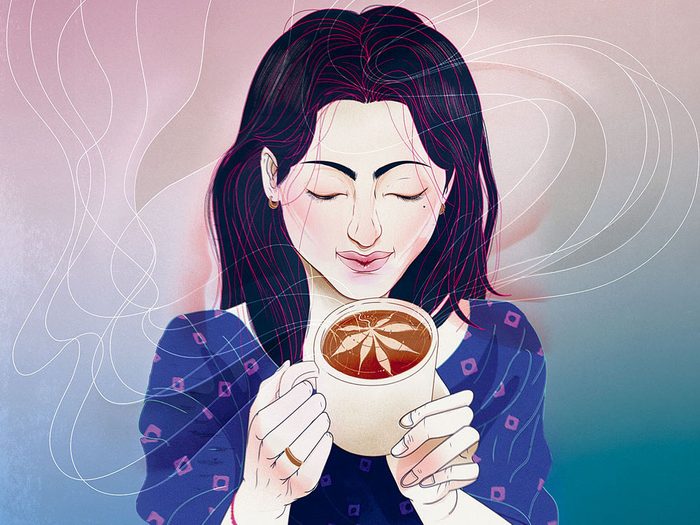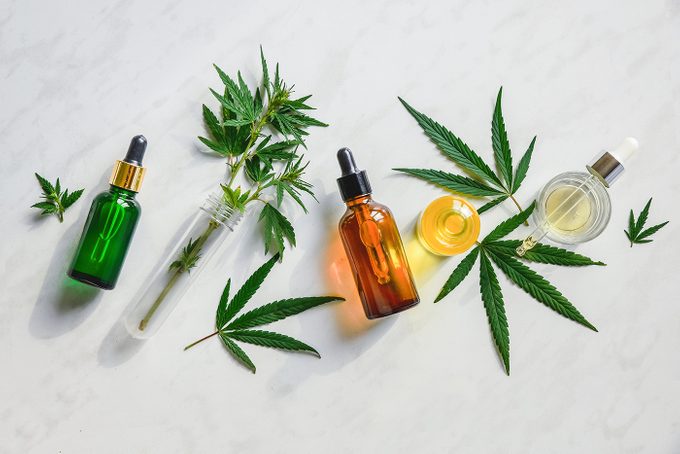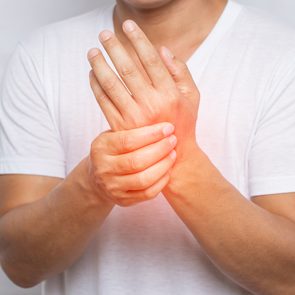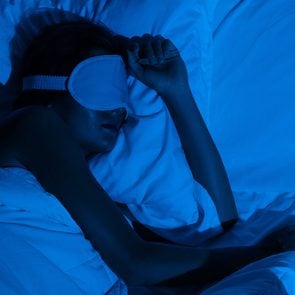Can CBD Treat Anxiety, Chronic Pain and Stress? I Tried It To Find Out

Some experts believe the non-intoxicating cannabis compound can cure anxiety, chronic pain, sleeplessness and a thousand other problems. I decided to give it a try.
“I’d like a Relaxed Fit,” I type in an Instagram message to my potential drug dealer. It’s the code for her high-dose CBD cookies. (The THC-forward ones are called High Rise, get it? They’re both jeans, but those ones are high.) They’re $55 for a dozen, but she only has ginger with turmeric (blech!) available at the moment. I give up and log on to cbd2go.ca, load my cart with two tinctures and a pain salve and then begin watching my mailbox for the package that’s promising me sweet, sweet relief.
I’m not the only one waiting for the mail—CBD2GO’s website has constant pop-ups informing me that, in the past 10 hours, someone in Stouffville or Brampton or some other Canadian town purchased a 1,000-milligram Calyx Heal or coconut tincture. It’s like they’re shouting, “You! Law-abiding middle-aged mom—you are not alone! All these Extremely Average Humans have heard the promises of this magical elixir called CBD, and they, like the poster on Fox Mulder’s wall on The X-Files, want to believe.”
And I do. I do want to believe. I’m one of the many average humans who, along with not-so-average scientists, doctors and investors around the world, are currently obsessed with the possibilities that CBD—short for cannabidiol, one of at least 480 components of the cannabis plant—is dangling before our eyes. CBD isn’t intoxicating, unlike THC (a.k.a. tetrahydrocannabinol), the better-known cannabis derivative stoners have been buying from “a guy” for years.
It’s also a potent anti-inflammatory, and its advocates say this potential miracle medicine can help treat everything from pain, anxiety and sleep disorders to arthritis and even schizophrenia. The U.S. National Institutes of Health took out a patent on certain cannabinoids in 2003, and in 2018 the U.S. Food and Drug Administration approved a CBD-derived drug for the treatment of particular types of epilepsy (a similar medication underwent a promising clinical trial in Canada in 2019). In the U.S., depending on what state you’re in, you can buy a dizzying array of CBD-infused products, including luxury skin care, teas, makeup, beverages and lube.
Canada legalized the use and sale of certain kinds of recreational cannabis—flower, oils, seeds and plants—in 2018. The next wave of legalization, which covers edibles, extracts and topicals, happened in fall 2019. Ever since the weed door opened, the biggest buzz has been around CBD. This makes sense given the potential size of the market—your neighbour might not smoke a joint in the rec room with you, but she definitely has sore knees and would like to try some of that “special” balm you told her about. People have always found ways to get high, but can CBD make us well?

Life without pain
Deena Gandin certainly thinks so. After years of pain caused by her house cleaning job—and two car accidents within 10 months in 2018—the 48-year-old from Binbrook, Ontario, was ready to try anything.
“I’m the most skeptical person on the planet,” she says. “But I didn’t want to be on narcotics. I finally just said, ‘The heck with it,’ and tried CBD.” She used a CBD oil. “It was life changing. I was like, ‘Oh my gosh, is this what it’s like to not live in pain?!’ I used to come home at four and barely be able to make it to the couch. Now I can keep going until nine. I’ve told everybody—I’m ready to shout it out from the mountaintops.”
Gandin also noticed another interesting change when she started taking CBD—her lifelong depression and anxiety subsided. “I don’t have that horrible feeling of worry in my stomach anymore,” she says.
How can one molecule affect so many things? And if CBD does, in fact, help treat all the conditions researchers think it might, how does it know where to go in the body? “There are scientists all over the world trying to figure that out,” laughs Danielle Blair, the founder of Calyx Wellness, a Canadian company that produces CBD products. “Our body just knows exactly where it needs to be.”
Part of the answer probably has to do with our endocannabinoid system (ECS). The ECS, which was only discovered by medical researchers in the 1990s, is a network of cannabinoid transmitters and receptors that helps maintain the body’s homeostasis, or balance. Our bodies naturally produce cannabinoids on their own, and there are receptors for them all over the place—including in the brain, heart, pancreas, nerve cells, skin, reproductive organs, digestive system and liver—that influence things like our immune response and levels of inflammation, appetite and pain.
Cannabinoids are also produced in cannabis plants—these are called phytocannabinoids. When phytocannabinoids meet human body cannabinoid receptors, it’s like an affair that was always meant to happen.
Dr. Richa Love is one of the more outspoken proponents of CBD. She’s the founder of CannU Educational Services, an online cannabis education platform. “Think of the receptors as locks,” she explains, “and think of cannabinoids as the keys.” (That’s the gist of the ECS, though CBD doesn’t technically go into the locks—it just activates them, prompting the body to produce even more of its own cannabinoids.)
Love has been a family doctor for almost 20 years. About five years ago, she turned down an elderly patient who asked for a medical cannabis prescription to help relieve arthritis pain. “All my training and all my instincts were to think of it as drug-seeking behaviour,” Love says. “So she went to another source, and then I saw how her arthritis got significantly better. That was a humbling moment as a physician.”
Love suffers from rheumatoid arthritis herself. About four years ago she had a flare-up that was so bad she was in constant pain, on multiple medications and walking with a cane. Her rheumatologist even suggested maybe it was time to pause—or end—her career. “I tried CBD oil, and it transformed me,” Love says. “So I started to look at it more seriously.”

My first try
My personal interest in CBD stems from a long struggle with insomnia and more recent issues with chronic pain. Since I hit my 40s, I’ve been constantly straining or tearing things, resulting in a daily Advil-plus-Tylenol (then maybe some more Advil, topped off with a splash of Aleve) habit, which is likely wreaking havoc on my liver and kidneys. I’ve also taken benzodiazepines for sleep on and off for almost 15 years, lately more on than off, putting me at a higher risk for developing a dependence and, eventually, dementia. Massage, osteopathy, surgery, acupuncture, cognitive behavioural therapy and meditation—among other things—haven’t totally fixed either issue.
“Mommy can’t play with you right now,” I tell my eight-year-old. “Mommy’s arm hurts. Mommy is tired.”
“You’re always tired,” he sighs.
I need to find another way. And then my other way arrives in my mailbox.
I try a small array of CBD-infused products—chosen by the extremely unscientific method of how much I like their websites—to deal with my chicken-egg situation (my insomnia exacerbates my pain, but my pain keeps me from sleeping). A salve from a company called Organa doesn’t provide relief to my arm, where I’m still healing from a tendon- and ligament-repair surgery, or my leg, where my doctors think I’m experiencing referred pain from a torn tendon in my ankle—perhaps a tall order for a $35 product. I take 30 milligrams of CBD oil capsules from a company called CoCos Pure for a couple weeks, to little effect.
I’m starting to lose hope. Then I turn to the priciest option in my new arsenal: Calyx’s Heal tincture, which costs $140 for a 30-millilitre bottle of 1,000-milligram-strength CBD oil. “Heal is intended to treat more serious health conditions,” CBD2GO promises, without naming any specific ailments. “It delivers a larger dose to the mind and body to kick-start the healing process.”
“Whatever,” I think, popping open the top. “It’s all probably snake oil.” I start taking the oil—holding it under my tongue for 30 seconds and then swallowing it—with my daily vitamins and supplements. It’s, you know, oily, but otherwise inoffensive. I misread the instructions and end up ingesting more than the maximum recommended dose of 45 drops a day—about 60, divided into two full droppers throughout the evening—for about two weeks. This amounts to approximately 68 milligrams of CBD a day, more than double what I had tried before. (Thankfully it’s very hard to overdose on CBD: unlike opiate receptors, none of the cannabinoid receptors are located in the part of the brain stem that controls your breathing and heart. Also, because CBD research is still in its relative infancy, there isn’t a standard for what’s an appropriate dose.)
And guess what? I think it starts to work. It’s not like popping a Percocet or a sleeping pill—where you get an instant, obvious result—but I notice I’m taking fewer pain and sleeping meds, I’m sleeping better, and I’m more chill and less grumpy, even when I’m overtired.
It could be the placebo effect, but I feel it helps enough that I decide to try to get a medical prescription for cannabis so my insurance will help with the cost. Manulife and Sun Life both cover it. To my great surprise, both my family doctor and a pain specialist turn me down immediately, saying there isn’t enough evidence that it treats insomnia or chronic pain.
How could this be? I call Love again. It turns out they’re right—sort of. There is lots of evidence demonstrating CBD’s efficacy for managing pain, but it’s all from observational studies or animal studies. There have been almost no double-blind, placebo-control trials.
“The amount of enthusiasm people have for these products at the moment far exceeds our understanding of them,” says Dr. Michael Allan, the director of program and practice support at the College of Family Physicians of Canada and the lead author on a set of simplified guidelines for cannabinoid use.
The guidelines recommend medical cannabinoid use as a last resort for a small subset of conditions, including neuropathic and end-of-life pain, and chemotherapy-induced nausea. The guidelines don’t differentiate between products that are high in CBD and those that are high in THC. The research that’s available, says Allan, is focused on THC and is obtained mostly from people who are already using cannabis, which creates a huge bias. “It’s guesswork at this point,” he says. “The limited studies seem to indicate a combination of inhaled THC and CBD is needed for pain. CBD on its own seems to have no benefits.”
Love won’t give up on the promise of CBD. “It isn’t a chemical model that can be replicated the same way over and over in a lab,” she says. “CBD is plant-based medicine—it’s a square peg that’s not going to fit in the round hole we’ve created for pharma. Also, there are hundreds of different types available on the Canadian market. Which ones are you going to study?”
Love puts doctors’ reluctance to prescribe it down to a combination of a lack of education when it comes to the rapidly evolving field—since the endocannabinoid system wasn’t discovered until the 1990s, a lot of doctors didn’t learn about it in medical school, and even now it’s often not on the curriculum—and, worse, a hesitation born out of a lingering discomfort around any kind of cannabis use.
CBD may be just the beginning of the useful compounds found in cannabis—the properties and uses of the dozens of others it contains are only starting to be understood. (If you haven’t heard about cannabigerol or cannabinol yet, you probably will soon, but that’s a story for another day.)
Despite the unknowns, there’s one story I’ve heard from every CBD expert I’ve spoken to, and it goes like this: In a time that’s not so far away, taking CBD will be as common as popping a multivitamin or supplement.
“It will become an absolutely normal thing,” predicts Blair. “You’ll wake up and take your CBD and your fish oil. It’s the best anti-inflammatory in plant medicine and so many diseases stem from chronic inflammation. People will say, ‘Of course I take CBD.’”
2019, Leah Rumack. From “CBD Is Touted As A Miracle Compound, But Does It Actually Work? We Tried it,” Chatelaine (December 2019).
Next, find out if blue light glasses really work.






